How many musicians can you fit in the main space of the Fidelio Orchestra Café? The answer is 23 string players in masks, for the recording of Strauss’s Metamorphosen of which I was a solitary witness in the summer. With diners accommodated, probably four is the limit. It's being tested this week with the first emergence of a piano quartet I’ve witnessed since March, violinist Benjamin Baker, viola player Timothy Ridout, cellist Bartholomew LaFollette and pianist Louis Schwizgebel sparing nothing in the storm and stress of teenage Mahler’s solitary movement and the much more chameleonic gigantism of Brahms’s G minor (First) Piano Quartet.
The adolescent’s accomplished play-acting, raised to a level of cascading frenzy by the strings, sounding for all the world like an octet, and a torrid cadenza from Schwizgebel, would have been overshadowed by the master, had it not been for a stunning link which made the programme truly adventurous in its continuity: Schnittke’s 1988 working of the 16-year-old Mahler’s 25-bar sketch for an ensuing scherzo into his own crazy world – beyond Brahms and even Schoenberg before going back to 1861. There are tone-rows, chord-clusters and grating dissonances before the head explodes in an upward glissando – Schnittke had suffered his first stroke three years earlier – and the scherzo-melody emerges with gentle but restless figuration (in the manner of Schubert’s “Gretchen at the Spinning Wheel” with its telling opening lines “My peace is gone, my heart is heavy”) and a final death. It was good to be harried before dinner when the playing was as fine as this.  Yet out of the silence rose the opening mystery of the Brahms. On a previous occasion, at the Stavanger Festival, I’d been much struck by how Berlin Philharmonic and former Jerusalem Quartet viola-player Amihai Grosz made a difference as a kind of golden centre to the work; that was equally true of young Timothy Ridout, the next great player in violaworld. He never dominated unduly, but when a line of sheer beauty flashed out, he sang it as consummately as Baker (they have played together as a duo in one of the Wigmore’s June concerts). LaFollette echoed their songs in the exquisite after-dessert encore, the slow movement of Schumann’s Piano Quartet. But the tour de force – it can never be anything else – was the wild Rondo alla zingarese which sweeps the Brahms quartet to its delirious conclusion. Breaths needed catching as one idea tumbled on the heels of another, Schwizgebel’s virtuosity as the piano comes rippling into the limelight reflected in the strings’ eventual returning of the compliment. Glasses could have been shattered, plates smashed, if the audience really let rip with how it felt about all this.
Yet out of the silence rose the opening mystery of the Brahms. On a previous occasion, at the Stavanger Festival, I’d been much struck by how Berlin Philharmonic and former Jerusalem Quartet viola-player Amihai Grosz made a difference as a kind of golden centre to the work; that was equally true of young Timothy Ridout, the next great player in violaworld. He never dominated unduly, but when a line of sheer beauty flashed out, he sang it as consummately as Baker (they have played together as a duo in one of the Wigmore’s June concerts). LaFollette echoed their songs in the exquisite after-dessert encore, the slow movement of Schumann’s Piano Quartet. But the tour de force – it can never be anything else – was the wild Rondo alla zingarese which sweeps the Brahms quartet to its delirious conclusion. Breaths needed catching as one idea tumbled on the heels of another, Schwizgebel’s virtuosity as the piano comes rippling into the limelight reflected in the strings’ eventual returning of the compliment. Glasses could have been shattered, plates smashed, if the audience really let rip with how it felt about all this.
As it was, the appreciation at the end was very vocal, because you don’t often get playing like this offered up to 25 spectators. Except at the Fidelio Orchestra Café, where it seems to happen every time. And, while some of us may be coming to take the Wigmore Hall a little for granted already, on each occasion here the impact is fresh and astounding: a genuine success story of the Covid era.
- One more performance at the Fidelio Orchestra Cafe tonight - sold out, but many more events coming up as listed here
- More classical music reviews on theartsdesk














Add comment